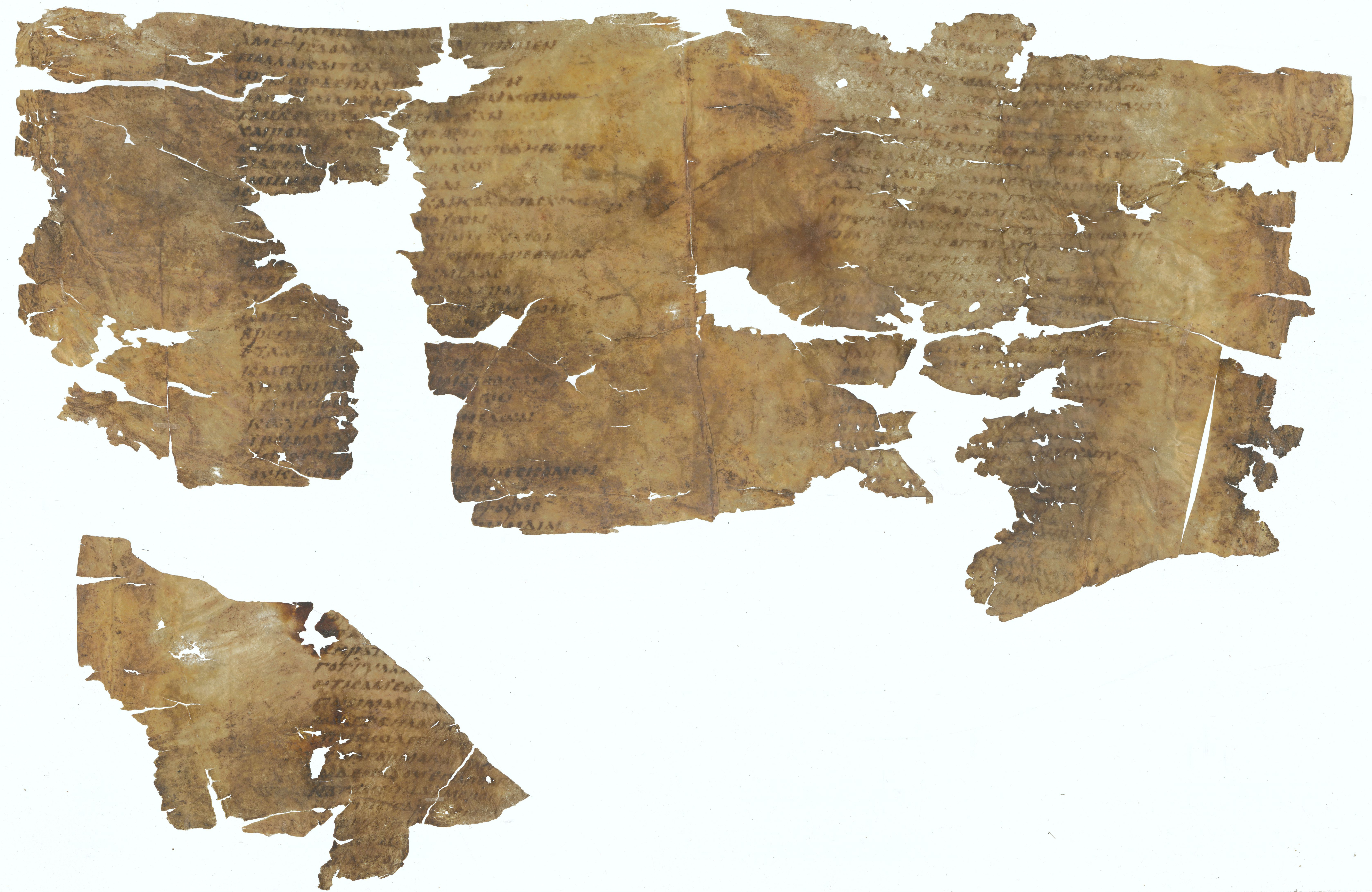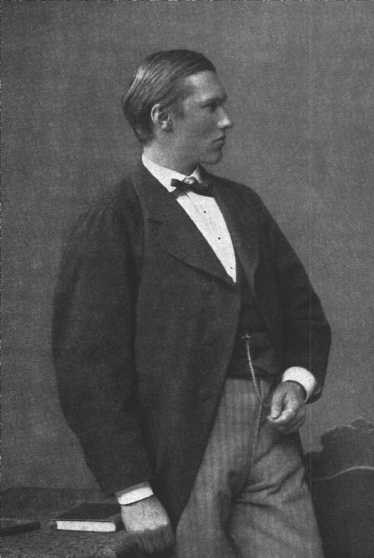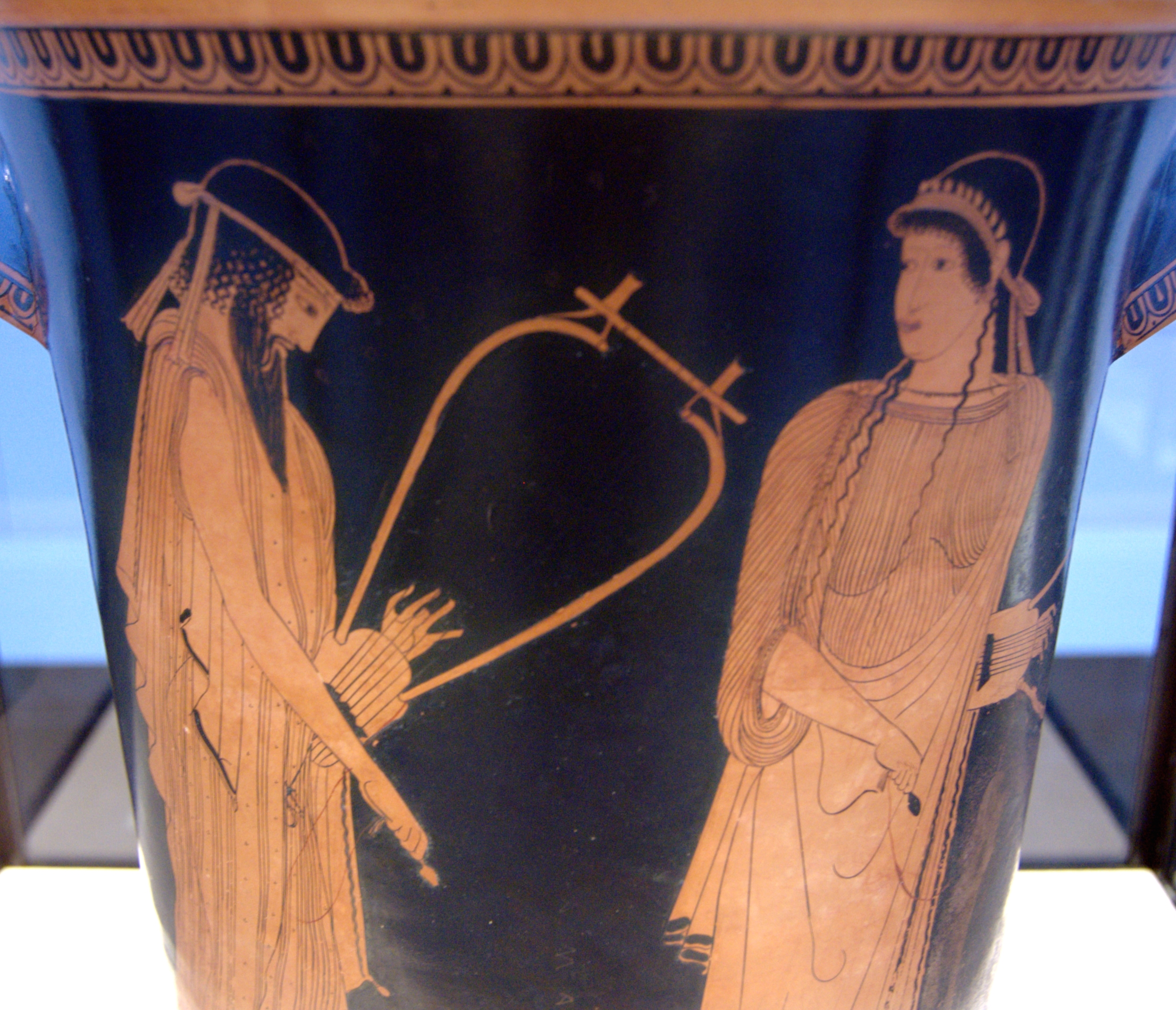|
Sappho 96
Sappho 96 is a poem by the archaic Greek lyric poet Sappho. 37 lines of the fragment are preserved on a 6th-century parchment. The first twenty lines describe an imaginary scene in which an unnamed woman is struck by grief remembering an absent companion, Atthis; the remaining 17 lines, possibly originally a separate poem, reflects more generally on the foolishness of trying to compare human and divine beauty. As with other poems by Sappho such as poem 16 and 94, memory is a major theme. Preservation The poem was one of a group (Sappho 92–97) preserved on a parchment, P. Berol. 9722, found in Egypt. It was originally part of a book created in the sixth century AD. The parchment is 12 cm high (though the page was originally about twice this height) and 43.5 cm wide, and consists of a double-page spread with a third page sewn to the right hand side. It is part of the collection of the Egyptian Museum of Berlin, which acquired it in 1896, a gift of a Dr Reinhard ... [...More Info...] [...Related Items...] OR: [Wikipedia] [Google] [Baidu] |
Eva-Maria Voigt
Eva-Maria Voigt (, born Eva-Maria Hamm) was a German classical philologist, known for her work on the archaic Greek poets Sappho and Alcaeus. Life She studied Classical Philology at the University of Hamburg, and received her doctorate in 1945 with a dissertation ''"Zur Nominal- und Verbalflexion bei Sappho und Alkaios"''. From 1955 to 1984, she worked as editor of the ''Lexicon of the Early Greek Epic'', completed in 2010. In 1971, Voigt published ''Sappho et Alcaeus: Fragmenta''. She was a professor of classical philology at the University of Hamburg The University of Hamburg (, also referred to as UHH) is a public university, public research university in Hamburg, Germany. It was founded on 28 March 1919 by combining the previous General Lecture System ('':de:Allgemeines Vorlesungswesen, .... She retired in April 1983, to Waldkirch. Works * ''Fragmente von Sappho und Alkaios'', Amsterdam, Athenaeum-Polak & Van Gennep, 1971. * ''Grammatik zu Sappho und Alkaios'' (B ... [...More Info...] [...Related Items...] OR: [Wikipedia] [Google] [Baidu] |
Wilhelm Schubart
Friedrich Wilhelm Ludwig Schubart (21 October 1873 – 9 August 1960) was a German ancient historian. He was a leading authority in the field of papyrology. Schubart was born on 21 October 1873 in Liegnitz, then part of the German Empire. He studied classical philology and philosophy at the Universities of Tübingen, Halle, Berlin and Breslau, earning his PhD at the latter institution in 1897. In 1900 he obtained his habilitation in ancient history at Berlin, becoming an associate professor in 1912. From 1931 to 1937 he was an honorary professor in Berlin, later serving as a professor of ancient history at the University of Leipzig (1948–1952).Professorenkatalog der Universität Leipzig Biographical sketch From 1901 to 1912 he worked as an assistant director at the [...More Info...] [...Related Items...] OR: [Wikipedia] [Google] [Baidu] |
Vocative
In grammar, the vocative case (abbreviated ) is a grammatical case which is used for a noun that identifies a person (animal, object, etc.) being addressed or occasionally for the noun modifiers (determiners, adjectives, participles, and numerals) of that noun. A vocative expression is an expression of direct address by which the identity of the party spoken to is set forth expressly within a sentence. For example, in the sentence "I don't know, John," ''John'' is a vocative expression that indicates the party being addressed, as opposed to the sentence "I don't know John", in which "John" is the direct object of the verb "know". Historically, the vocative case was an element of the Indo-European case system and existed in Latin, Sanskrit, and Ancient Greek. In many modern Indo-European languages (English, Spanish, etc.) the vocative case has been absorbed by the nominative, but others still distinguish it, including the Baltic languages, some Celtic languages and most Slavic l ... [...More Info...] [...Related Items...] OR: [Wikipedia] [Google] [Baidu] |
Wilamowitz
Enno Friedrich Wichard Ulrich von Wilamowitz-Moellendorff (22 December 1848 – 25 September 1931) was a German classical philologist. Wilamowitz, as he is known in scholarly circles, was a renowned authority on Ancient Greece and its literature. Life Youth Wilamowitz-Moellendorff was born in Markowitz (Markowice), a small village near Hohensalza (Inowrocław), in the then Province of Posen (now part of the Kuyavian-Pomeranian Voivodeship), to a Germanized family of distant Polish ancestry. His father, a Prussian Junker, was Arnold Wilamowitz, of Szlachta origin and using the Ogończyk coat of arms, while his mother was Ulrika, née Calbo. The couple settled in a small manor confiscated from a local noble in 1836. The Prussian part of their name, von Moellendorf, was acquired in 1813 when Prussian field marshal Wichard Joachim Heinrich von Möllendorf adopted Ulrich's ancestors. Wilamowitz, a third child, grew up in East Prussia. In 1867 Wilamowitz passed his ''Abitu ... [...More Info...] [...Related Items...] OR: [Wikipedia] [Google] [Baidu] |
Suda
The ''Suda'' or ''Souda'' (; ; ) is a large 10th-century Byzantine Empire, Byzantine encyclopedia of the History of the Mediterranean region, ancient Mediterranean world, formerly attributed to an author called Soudas () or Souidas (). It is an encyclopedic lexicon, written in Medieval Greek, Greek, with 30,000 entries, many drawing from ancient sources that have since been lost, and often derived from Christianity in the Middle Ages, medieval Christian compilers. Title The exact spelling of the title is disputed. The transmitted title (''paradosis'') is "Suida", which is also attested in Eustathius of Thessalonica, Eustathius' commentary on Homer's epic poems; several conjectures have been made, both defending it and trying to correct it in "Suda". * Paul Maas (classical scholar), Paul Maas advocated for the spelling, connecting it to the Latin verb , the second-person singular imperative of , "to sweat". * Franz Dölger also defended , tracing its origins back to Byzantine mi ... [...More Info...] [...Related Items...] OR: [Wikipedia] [Google] [Baidu] |
Bacchius
A bacchius () is a metrical foot of three syllables, consisting of one unstressed syllable followed by two stressed ones. In accentual-syllabic verse we could describe a bacchius as a foot that goes like this: Example: When day breaks the fish bite at small flies. The Christmas carol 'No Small Wonder' by Paul Edwards is a fair example of usage. The name is thought to come from its use in ancient Greek songs to the god Bacchus In ancient Greek religion and myth, Dionysus (; ) is the god of wine-making, orchards and fruit, vegetation, fertility, festivity, insanity, ritual madness, religious ecstasy, and theatre. He was also known as Bacchus ( or ; ) by the Gre .... References Metrical feet {{poetry-stub ... [...More Info...] [...Related Items...] OR: [Wikipedia] [Google] [Baidu] |
Creticus
A cretic ( ), also known as an amphimacer ( ) and sometimes paeon diagyios, is a metrical foot containing three syllables: long, short, long (– ᴗ –). In Greek poetry, lines made entirely of cretic feet are less common than other metres. An example is Alcman 58. However, any line mixing iambs and trochees could employ a cretic foot as a transition. In other words, a poetic line might have two iambs and two trochees, with a cretic foot in between. In later poets the cretic foot could be resolved into a paeonic (ᴗ ᴗ ᴗ – or – ᴗ ᴗ ᴗ) or sometimes even five short syllables (ᴗ ᴗ ᴗ ᴗ ᴗ).West (1987), p. 39. In Latin, cretics were used for composition both in comedy and tragedy. They are fairly frequent in Plautus but rarer in Terence. (See Metres of Roman comedy.) Words which include a cretic (e.g. Latin '' cīvitās'' and its various inflections) cannot be used in works composed in dactylic hexameter or dactylic pentameter. For Romance language poetry, ... [...More Info...] [...Related Items...] OR: [Wikipedia] [Google] [Baidu] |
Glyconic
Glyconic (from Glycon, a Greek lyric poet) is a form of meter in classical Greek and Latin poetry. The glyconic line is the most basic and most commonly used form of Aeolic verse, and it is often combined with others. The basic shape (often abbreviated as gl) is as follows: : x x – u u – u – Here "x" indicates an anceps, "–" a longum, and "u" a brevis. "x x" is known as the Aeolic base, which can be a spondeus "– –", a trochee "– u", or an iamb "u –". The middle foot "– u u –" is a '' choriambus'', as a so-called choriambic nucleus is a defining element of Aeolic verse. As in all classical verse forms, the phenomenon of brevis in longo is observed, so although the last syllable can actually be short or long, it always "counts" as long. Related metres Runs of glyconic lines are often ended by a pherecratean (a catalectic glyconic): : x x – u u – – The acephalous ("headless") version (^gl), also known as the ''telesillean'' (Latin: ''telesilleu ... [...More Info...] [...Related Items...] OR: [Wikipedia] [Google] [Baidu] |
Gregory Hutchinson (classicist)
Gregory Owen Hutchinson (born 5 December 1957), known as G. O. Hutchinson, is a British classicist and academic, specialising in Latin literature, Ancient Greek literature, and Latin and Ancient Greek languages. Between 2015 and his retirement in 2023, he was the Regius Professor of Greek at the University of Oxford, and a Student (i.e. Fellow) of Christ Church, Oxford. Early life and education Hutchinson was born on 5 December 1957 in Hackney, London, England. He was educated at the City of London School, an all-boys private school in the City of London; he had been granted one of the free places funded by the Inner London Education Authority. He studied classics at Balliol College, Oxford, graduating with a Bachelor of Arts (BA) degree in 1979. He remained at Balliol to undertake postgraduate research and completed his Doctor of Philosophy (DPhil) degree in 1983. His doctoral thesis was titled "Aeschylus' '' Septem Contra Thebas'': Text and commentary". Academic career From ... [...More Info...] [...Related Items...] OR: [Wikipedia] [Google] [Baidu] |
Bushehr
Bushehr (; ) is a port city in the Central District (Bushehr County), Central District of Bushehr County, Bushehr province, Bushehr province, Iran, serving as capital of the province, the county, and the district. Etymology The roots of the name "Bushehr" are uncertain. It is unlikely that it is derived from ''Abū Šahr'' ("father of the city"), a theory which remains popular. It may be an abbreviation of Bokht-Ardashir ("Ardashir has given"), though this is not backed by conclusive evidence History Origins A number of alleged premodern references to Bushehr, including the first made by an Arab geographer in 1225, have been disputed as perhaps alluding to the modern city of Reishahr, a harbor 10 km to the south, where archaeological evidence points to the presence of a much older settlement. Reishahr is also most likely equivalent to the town of Mesambria, a place the Greeks knew since the campaign of Nearchus (died 300 BC), and which also has been occasionally identif ... [...More Info...] [...Related Items...] OR: [Wikipedia] [Google] [Baidu] |
Alcaeus Of Mytilene
Alcaeus of Mytilene (; , ''Alkaios ho Mutilēnaios''; – BC) was a lyric poet from the Greek island of Lesbos who is credited with inventing the Alcaic stanza. He was included in the canonical list of nine lyric poets by the scholars of Hellenistic Alexandria. He was a contemporary of Sappho, with whom he may have exchanged poems. He was born into the aristocratic governing class of Mytilene, the main city of Lesbos, where he was involved in political disputes and feuds. Biography The broad outlines of the poet's life are well known. He was born into the aristocratic, warrior class that dominated Mytilene, the strongest city-state on the island of Lesbos and, by the end of the seventh century BC, the most influential of all the North Aegean Greek cities, with a strong navy and colonies securing its trade-routes in the Hellespont. The city had long been ruled by kings born to the Penthilid clan but, during the poet's life, the Penthilids were a spent force and rival arist ... [...More Info...] [...Related Items...] OR: [Wikipedia] [Google] [Baidu] |
Vice-consul
A consul is an official representative of a government who resides in a foreign country to assist and protect citizens of the consul's country, and to promote and facilitate commercial and diplomatic relations between the two countries. A consul is generally part of a government's diplomatic corps or foreign service, and thus enjoys certain privileges and protections in the host state, albeit without full diplomatic immunity. Unlike an ambassador, who serves as the single representative of one government to another, a state may appoint several consuls in a foreign nation, typically in major cities; consuls are usually tasked with providing assistance in bureaucratic issues to both citizens of their own country traveling or living abroad and to the citizens of the country in which the consul resides who wish to travel to or trade with the consul's country. Origin and history Antecedent: the classical Greek ''proxenos'' In classical Greece, some of the functions of the mode ... [...More Info...] [...Related Items...] OR: [Wikipedia] [Google] [Baidu] |




